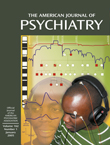Efficacy and Tolerability of Citalopram in the Treatment of Late-Life Anxiety Disorders: Results From an 8-Week Randomized, Placebo-Controlled Trial
Abstract
OBJECTIVE: Anxiety disorders are highly prevalent in elderly persons. However, to date, the efficacy of selective serotonin reuptake inhibitors (SSRIs) for the treatment of anxiety disorders in this age group has not been established. METHOD: Thirty-four participants age 60 and older with a DSM-IV anxiety disorder (mainly generalized anxiety disorder) and a Hamilton Anxiety Rating Scale score of 17 or higher were randomly assigned under double-blind conditions to either citalopram or placebo. Response was defined as a score of 1 (very much improved) or 2 (much improved) on the Clinical Global Improvement scale or a 50% reduction in the Hamilton anxiety scale score. Response and side effects with citalopram and placebo were compared by using chi-square tests and linear modeling. RESULTS: Eleven (65%) of the 17 citalopram-treated participants responded by 8 weeks, versus four (24%) of the 17 placebo-treated participants. The most common and problematic side effect in the citalopram group was sedation. CONCLUSIONS: The authors believe this to be the first prospective controlled study to test the efficacy of an SSRI in the management of anxiety disorders among the elderly. These results support the efficacy of citalopram in late-life anxiety disorders. They need to be replicated in a larger study group.



